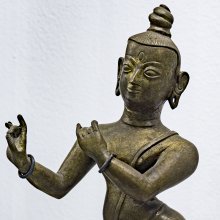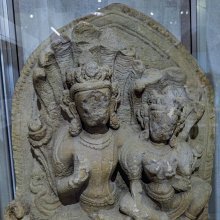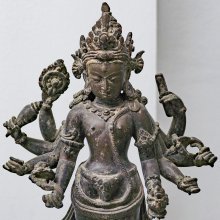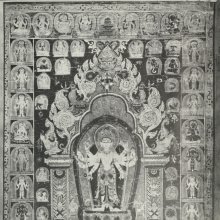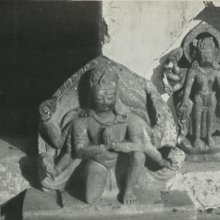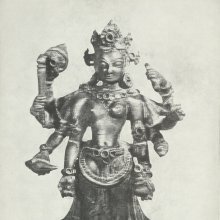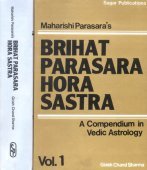Vasudeva, Vāsudeva, Vasudevā, Vāsudevā, Vasu-deva: 51 definitions
Introduction:
Vasudeva means something in Buddhism, Pali, Hinduism, Sanskrit, Jainism, Prakrit, the history of ancient India, Marathi, Hindi. If you want to know the exact meaning, history, etymology or English translation of this term then check out the descriptions on this page. Add your comment or reference to a book if you want to contribute to this summary article.
Images (photo gallery)
(+1 more images available)
In Hinduism
Pancaratra (worship of Nārāyaṇa)
Source: Wisdom Library: PāñcarātraVāsudeva (वासुदेव, “He who pervades and sports”):—One of the twenty-four forms of Viṣṇu through which Nārāyaṇa manifests himself. He is accompanied by a counterpart emanation of Lakṣmī (an aspect of Devī) who goes by the name Lakṣmī.
Source: SriMatham: Vaiṣṇava Iconology based on Pañcarātra ĀgamaThe transition from absolute transcendence of the Godhead to physical manifestation begins with the Highest Brahman—Vāsudeva, whose nature consists of Existence (sat), Consciousness (cit) Bliss (ānanda), Eternality (ananta) and Impeccability (amalam). The six attributes (ṣaḍguṇa) together form the "body" of the Supreme Being who gets the name Vāsudeva.

Pancaratra (पाञ्चरात्र, pāñcarātra) represents a tradition of Hinduism where Narayana is revered and worshipped. Closeley related to Vaishnavism, the Pancaratra literature includes various Agamas and tantras incorporating many Vaishnava philosophies.
Shaktism (Shakta philosophy)
Source: Wisdom Library: ŚāktismVāsudeva (वासुदेव, “God of Gods”):—Another name for Viṣṇu, as in, one of the male offspring from Mahāsarasvatī (sattva-form of Mahādevī). Mahāsarasvatī is one of the three primary forms of Devī, the other two being Mahālakṣmī and Mahākālī. Not to be confused with Sarasvatī, she is a more powerful cosmic aspect (vyaṣṭi) of Devi and represents the guṇa (universal energy) named sattva. Also see the Devī Māhātmya, a Sanskrit work from the 5th century, incorporated into the Mārkaṇḍeya-Purāṇa.

Shakta (शाक्त, śākta) or Shaktism (śāktism) represents a tradition of Hinduism where the Goddess (Devi) is revered and worshipped. Shakta literature includes a range of scriptures, including various Agamas and Tantras, although its roots may be traced back to the Vedas.
Vaishnavism (Vaishava dharma)
Source: ISKCON Press: GlossaryVasudeva (वसुदेव).—The father of Kṛṣṇa, and the half-brother of Nanda Mahārāja
Vāsudeva (वासुदेव).—The Supreme Lord, Kṛṣṇa, son of Vasudeva, and proprietor of everything, material and spiritual.
Source: Pure Bhakti: Bhagavad-gita (4th edition)Vāsudeva (वासुदेव) refers to “the son of Vasudeva, Śrī Kṛṣṇa”. (cf. Glossary page from Śrīmad-Bhagavad-Gītā).
Source: Pure Bhakti: Brhad BhagavatamrtamVāsudeva (वासुदेव) refers to:—The Supreme Lord, the embodiment of eternity knowledge, and bliss; the son of Vasudeva. (cf. Glossary page from Śrī Bṛhad-bhāgavatāmṛta).

Vaishnava (वैष्णव, vaiṣṇava) or vaishnavism (vaiṣṇavism) represents a tradition of Hinduism worshipping Vishnu as the supreme Lord. Similar to the Shaktism and Shaivism traditions, Vaishnavism also developed as an individual movement, famous for its exposition of the dashavatara (‘ten avatars of Vishnu’).
Purana and Itihasa (epic history)
Source: archive.org: Puranic Encyclopedia1) Vāsudeva (वासुदेव).—Being the son of Vasudeva, Śrī Kṛṣṇa was called Vāsudeva.
2) Vāsudeva (वासुदेव).—See under Pauṇḍrakavāsudeva.
3) Vasudeva (वसुदेव).—Father of Śrī Kṛṣṇa. Genealogy. See under Kṛṣṇa.
Source: archive.org: Shiva Purana - English Translation1) Vāsudeva (वासुदेव) is mentioned as a manifestation of Śiva, according to the Śivapurāṇa 2.5.2 (“The Prayer of the gods).—Accordingly, as the Gods eulogized Śiva: “[...] O great god, obeisance to Thee the delighter of the three worlds. Obeisance to Pradyumna, Aniruddha and Vāsudeva (these being your manifestations). Obeisance to Thee. Obeisance to Thee, the lord Saṃkarṣaṇa. Obeisance to Thee the destroyer of Kaṃsa. Obeisance to Thee O Dāmodara, the pounder of Cāṇūra, the partaker of poison. [...]”.
2) Vāsudeva (वासुदेव) refers to the foremost among all the Ādityas, according to the Śivapurāṇa 2.5.2 (“The Prayer of the gods).—Accordingly, as the Gods eulogized Śiva: “[...] Among all kindred beings you are Dharma. In all stages of life you are Sannyāsa. You are the supreme Liberation in all Vargas. Among Rudras you are Nīlalohita. Among all Ādityas you are Vāsudeva; among the monkeys you are Hanumat; among the sacrifices you are Japayajña; among the weapon-bearers you are Rāma. [...]”.
Source: Cologne Digital Sanskrit Dictionaries: The Purana Index1a) Vasudeva (वसुदेव).—Of the family of Yayāti; a son of Devamīḍha (also Śūra) and Māriṣā. He had a surname Ānakadundubhi because at his birth anakas and dundubhis were sounded as a sign of receiving Hari's grace. Married the seven daughters of Devaka; six other wives of:1 Father of Kṛṣṇa by Devakī; when marrying her he promised Kaṃsa, who drove the chariot and who heard a voice from air that her eighth son would kill him, to give him all sons born of Devakī to be killed by him. Took her first son to Kaṃsa who spared him; was thrown in prison with Devakī by Kaṃsa. Vasudeva's prayer to the new born Kṛṣṇa; took the babe to Nandagopa's house and exchanged him for the daughter, born to Yaśoda at that time, without anybody knowing it. Released by Kaṃsa;2 met Nanda who went to the capital for paying annual tribute and after enquiring of his welfare advised him to return home as he expected some trouble at the Vraja. Requested Garga to go to Vraja and perform saṃskāras to his sons.3 Visited by Nārada. Vasudeva enquired of bhāgavata dharma; listened to the traditional account of the talk between the nine sons of Ṛṣabha and Nimi and was pleased along with Devakī;4 met by Kṛṣṇa at Sudharmā sabhā painted by Citralekhā;5 joined the Yadus in defeating Pauṇḍraka Māyā.
- 1) Bhāgavata-purāṇa IX. 24., 23-45; Brahmāṇḍa-purāṇa III. 61. 23; 71. 146, 160-1, 174; Matsya-purāṇa 44. 72; Vāyu-purāṇa 86. 28; 96. 144, 159-161, 198; 98. 94; Viṣṇu-purāṇa IV. 14. 19.
- 2) Bhāgavata-purāṇa I. 1. 12; 2. 7; 8. 33; III. 2. 25; X. 26. 17; 1. 23 to the end; ch. 3 (whole); 4. 14 and 24; Brahmāṇḍa-purāṇa III. 71. 210-35; Matsya-purāṇa 46. 1-2; 47. 2-6; Viṣṇu-purāṇa V. 1. 5; 3. 15-23.
- 3) Bhāgavata-purāṇa X. 5. 20-31; 8. 1.
- 4) Ib. XI. 2. 3; 31. 15-22.
- 5) Ib. X. [67 (v) 42, 47]; 62. 20.
1b) A Kaṇva and a minister of the Śunga king Devabhūti; (Matsya-purāṇa and Brahmāṇḍa-purāṇa-Devabhūmi); killed his master and became king. Father of Bhūmitra; ruled for five years; began the line of Kāṇvāyanas.*
- * Bhāgavata-purāṇa XII. 1. 19-20; Brahmāṇḍa-purāṇa II. 74. 156; Matsya-purāṇa 272. 32; Viṣṇu-purāṇa IV. 24. 39-40.
1c) A son of Cancu.*
- * Viṣṇu-purāṇa IV. 3. 25.
2) Vasudevā (वसुदेवा).—A daughter of Gādinī.*
- * Vāyu-purāṇa 96. 111.
3a) Vāsudeva (वासुदेव).—Another name for Kṛṣṇa (s.v.) equal to Nārāyaṇa in qualities; value of bhakti towards: His immanence in the Universe: worshipped in the Kaliyuga by the righteous;1 Manu takes the fish to be;2 requested by the gods to vanquish Hiraṇyakaśipu; created Śuṣkarevatī to vanquish the Asuras;3 the presiding deity of planets;4 as a son of Aditi;5 Incon of gifts pleasing to;6 eternal and real;7 numerous sons of;8 got the divine chariot.9
- 1) Bhāgavata-purāṇa X. 8. 14 and 19; I. 2. 7-34; XII. 2. 22 and 38. Brahmāṇḍa-purāṇa I. 2. 37; Vāyu-purāṇa 1. 148; 23. 218; Viṣṇu-purāṇa II. 12. 44-7; 15. 35; IV. 13. 105; V. 17. 15; 18. 58; 37. 28; 38. 9. VI. 3. 41; 5. 76, 80.
- 2) Matsya-purāṇa 1. 26; 2. 16; 45. 18; 52. 20-22; 69. 7; Viṣṇu-purāṇa I. 2. 12; 4. 18; 11. 55; 19. 24.
- 3) Matsya-purāṇa 161. 29-31; 179. 35-6.
- 4) Matsya-purāṇa 230. 9; 242. 16.
- 5) Ib. 244. 35-42; 245. 20-36; 248. 46.
- 6) Ib. 258. 9; 274. 5; 285. 16.
- 7) Viṣṇu-purāṇa III. 8. 24, 32; IV. 4. 80; VI. 7. 56.
- 8) Matsya-purāṇa 47. 20-21; Vāyu-purāṇa 96. 45, 244; 111. 21.
- 9) Ib. 93. 27.
3b) An author on architecture.*
- * Matsya-purāṇa 252. 3.
3c) A Vaṃśavīra.*
- * Vāyu-purāṇa 97. 1.
Vāsudeva (वासुदेव) is a name mentioned in the Mahābhārata (cf. I.61.91) and represents one of the many proper names used for people and places. Note: The Mahābhārata (mentioning Vāsudeva) is a Sanskrit epic poem consisting of 100,000 ślokas (metrical verses) and is over 2000 years old.
Source: Shodhganga: The saurapurana - a critical studyVasudeva (वसुदेव) refers to one of the sons of Kroṣṭā and grandson of Yadu, according to the Vaṃśānucarita section of the 10th century Saurapurāṇa: one of the various Upapurāṇas depicting Śaivism.—Accordingly, [...] Nahuṣa married Virajā (the daughter of Pitṛ) and was blessed with five sons of whom Yayāti was the most famous. Yayāti had two wives—Devayānī and Śarmiṣṭhā. Devayānī gave birth to Yadu and Turvasu. [...] The Son of Yadu was Kroṣṭā in whose race the most glorious kings were born. The text only names them as [viz., Vasudeva].
Ugrasena’s daughter was Devakī who married Vasudeva and from them Viṣṇu by the curse of Bhṛgu was born as Kṛṣṇa. From Vasudeva’s other wife Rohiṇī was born Saṃkarṣaṇa. Kṛṣṇa had sixteen thousand wives from whom innumerable sons like Pradyumna and others were born.

The Purana (पुराण, purāṇas) refers to Sanskrit literature preserving ancient India’s vast cultural history, including historical legends, religious ceremonies, various arts and sciences. The eighteen mahapuranas total over 400,000 shlokas (metrical couplets) and date to at least several centuries BCE.
Kavya (poetry)
Source: Shodhganga: A critical appreciation of soddhalas udayasundarikathaVāsudeva (वासुदेव).—One of the incarnations of Viṣṇu.—As Vāsudeva, he rescued the people from the clutched of cruel Kaṃsa, Kaiṭahha, Madhu, Mura and others.
Source: Shodhganga: The Kavyamimamsa of RajasekharaVasudeva (वसुदेव) is the name of an important person (viz., an Ācārya or Kavi) mentioned in Rājaśekhara’s 10th-century Kāvyamīmāṃsā.—In the historical evidance, there are two well-known kings named were Vāsudeva. Butthey are flourished in different times. It cannot be certain that between them which one Rājaśekhara refer in his Kāvyamīmāṃsā.

Kavya (काव्य, kavya) refers to Sanskrit poetry, a popular ancient Indian tradition of literature. There have been many Sanskrit poets over the ages, hailing from ancient India and beyond. This topic includes mahakavya, or ‘epic poetry’ and natya, or ‘dramatic poetry’.
Shilpashastra (iconography)
Source: archive.org: Pratima Kosa Encyclopedia of Indian Iconography - Vol 6Vāsudeva (वासुदेव) refers to one of the many varieties of the Śālagrāma (ammonite fossil stones).—The Vāsudeva stone is round in shape, with two cakras at the opening, whitish in hue, even on all sides (sama), and bright-looking. Śālagrāma stones are very ancient geological specimens, rendered rounded and smooth by water-currents in a great length of time. They (e.g., Vāsudeva stones) are distinguished by the ammonite (śālā, described as “vajra-kīṭa”, “adamantine worms”) which having entered into them for residence, are fossilized in course of time, leaving discus-like marks inside the stone.
Source: archive.org: Isvara Samhita Vol 5 (shilpa)Vāsudeva (वासुदेव) is the name of a deity corresponding to the first vyūha (part of five-fold manifestation of the Supreme Consciousness) according to Pāñcarātrins thought.—Among them, the form of the first God (Vāsudeva) has the splendour of snow, kunda flower and moon, lour arms, pleasing face, eyes resembling the lotus and yellow silken garment, beautified by a golden flag, offering security to the frightened people by the main right hand, holding the great conch, which is a treasure of learning with the left hand, the discus present (rising) (held high) in the other hind right hand and the mace, in the (similar) left (hand) resting on the ground.
All these (e.g., Vāsudeva) wear vanamālā, have the marks of Śrīvatsa, and shine with Kaustubha, the king of gems in the chest. They are to be thought of as always having crown, crest, beautiful necklace, armlets and anklets, variegated ornamental marks in the forehead, have the shining ear rings resembling the crocodiles, have different kinds of garlands and adorned with smearing of the beautiful camphor etc.
Vāsudeva, the Lord of the world is to be worshipped (or considered), O wise man! He is of white and red lustre amidst east and south. The Lord takes to different places because of very pure intentions like the crystal takes to a variegated form with two colours because of two complexions which is the mark of dissolutions.
Source: Shodhganga: The significance of the mūla-beras (śilpa)Vāsudevā is the name of a deity depicted at the Ranganathaswamy Temple in Srirangam (Śrī Raṅgam), which represents a sacred place for the worship of Viṣṇu.—Vāsudevā is found in samapāda-sthānaka with four hands. The upper hands hold prayōga-cakra and śaṅkha in the right and the left in kartarīmukha-hasta. The lower hands hold abhaya in the right and nidrā-hasta in the left holding the mace.

Shilpashastra (शिल्पशास्त्र, śilpaśāstra) represents the ancient Indian science (shastra) of creative arts (shilpa) such as sculpture, iconography and painting. Closely related to Vastushastra (architecture), they often share the same literature.
Vyakarana (Sanskrit grammar)
Source: Wikisource: A dictionary of Sanskrit grammarVāsudeva (वासुदेव).—(शास्त्री (śāstrī)) surnamed Abhyankar, who lived from 1863 to l942 and did vigorous and active work of teaching pupils and writing essays, articles, commentary works and original works on various Shastras with the same scholarship, zeal and acumen for fifty years in Poona. He wrote गूढार्थप्रकाश (gūḍhārthaprakāśa) a commentary on the Laghusabdendusekhara and तत्त्वादर्श (tattvādarśa) a commentary on the Paribhasendusekhara in 1889. His edition of the Patanjala Mahabhasya with full translation and notes in Marathi can be called his magnum opus. See अभ्यंकर (abhyaṃkara).

Vyakarana (व्याकरण, vyākaraṇa) refers to Sanskrit grammar and represents one of the six additional sciences (vedanga) to be studied along with the Vedas. Vyakarana concerns itself with the rules of Sanskrit grammar and linguistic analysis in order to establish the correct context of words and sentences.
Ayurveda (science of life)
Rasashastra (Alchemy and Herbo-Mineral preparations)
Source: Wisdom Library: Rasa-śāstraVāsudeva (वासुदेव) or Vāsudevarasa is the name of an Ayurvedic recipe defined in the fourth volume of the Rasajalanidhi (chapter 3, grahaṇī: chronic diarrhoea). These remedies are classified as Iatrochemistry and form part of the ancient Indian science known as Rasaśāstra (medical alchemy). However, since it is an ayurveda treatment it should be taken with caution and in accordance with rules laid down in the texts.
Accordingly, when using such recipes (e.g., vāsudeva-rasa): “the minerals (uparasa), poisons (viṣa), and other drugs (except herbs), referred to as ingredients of medicines, are to be duly purified and incinerated, as the case may be, in accordance with the processes laid out in the texts.” (see introduction to Iatro chemical medicines)
Unclassified Ayurveda definitions
Source: archive.org: Vagbhata’s Ashtanga Hridaya Samhita (first 5 chapters)1) Vāsudeva (वासुदेव) or is the author of the Anvayamālā: a commentary on the Aṣṭāṅgahṛdayasaṃhitā: one of the three great works of Vāgbhaṭa.—The Aṣṭāṅgahṛdayasaṃhitā consists only of verses. The eight-fold division is observed in the Aṣṭāṅgahṛdayasaṃhitā too, though not as strictly as in the Aṣṭāṅgasaṃgraha. Numerous commentaries on the Aṣṭāṅgahṛdayasaṃhitā [viz., Vāsudeva’s Anvayamālā], many of them unedited so far, can be traced in manuscripts, catalogues, publishers’ lists, etc.
2) Vāsudeva (वासुदेव) is also the name of the grandfather of Hemādri: the author of the Āyurvedarasāyana: a commentary on the Aṣṭāṅgahṛdayasaṃhitā: one of the three great works of Vāgbhaṭa.—Hemādri was the son of Kāmadeva, grandson of Vāsudeva, and great-grandson of Vāmana. Besides the Caturvargacintāmaṇi and Āyurvedarasāyana, he wrote several other works (Śrāddhapaddhati, Hemādriprayoga, Nānāśāntayaḥ, Tristhalīvidhi) and commentaries (on Vopadeva’s Muktāphala and Śaunaka’s Pravaṇakalpa); but he is different from Bhaṭṭa Hemādri, the son of Īśvarasūri and author of the Raghuvaṃśadarpaṇa.

Āyurveda (आयुर्वेद, ayurveda) is a branch of Indian science dealing with medicine, herbalism, taxology, anatomy, surgery, alchemy and related topics. Traditional practice of Āyurveda in ancient India dates back to at least the first millenium BC. Literature is commonly written in Sanskrit using various poetic metres.
Chandas (prosody, study of Sanskrit metres)
Source: Shodhganga: a concise history of Sanskrit Chanda literatureVāsudeva (वासुदेव) (18th century), the author of Vṛttagajendramokṣa belongs to Puruvana (a place near Trichur in Kerala state of India). Kunjunni Raja K. identifies this Vāsudeva of Vṛttagajendramokṣa as same with Vāsudeva of the famous Yamaka poem Yudhiṣṭhiravijaya. Hence it can be said that Vāsudeva was also inspired to compose this Gajendramokṣa by the blessings of his principal deity Bhūtanātha (Śāstṛ), son of Śiva and Viṣṇu. He identifies the time of Vāsudeva of Yudhiṣṭhiravijaya as 18th cent. Apart from the views of Kunjunni Raja, there are also other views regarding the authorship of Vāsudeva.

Chandas (छन्दस्) refers to Sanskrit prosody and represents one of the six Vedangas (auxiliary disciplines belonging to the study of the Vedas). The science of prosody (chandas-shastra) focusses on the study of the poetic meters such as the commonly known twenty-six metres mentioned by Pingalas.
Vastushastra (architecture)
Source: archive.org: Bharatiya vastu-sastraVāsudeva (वासुदेव) is the name of an ancient teacher (ācārya) of Vāstuśāsta (science of architecture) according to the Matsyapurāṇa.—All these great teachers cannot be said to be legendary. Some used to be propagated in ancient India. No nation can flourish without its care for its material prosperity. All this technique and training and their systematic and successful teaching and transmission were of equal importance. Most of the treatises of Vāstuśāstra carry many of these names [i.e., Vāsudeva], yet a good many of them are quoted as authorities, yet still others are honoured with actual passages being quoted from their works.

Vastushastra (वास्तुशास्त्र, vāstuśāstra) refers to the ancient Indian science (shastra) of architecture (vastu), dealing with topics such architecture, sculpture, town-building, fort building and various other constructions. Vastu also deals with the philosophy of the architectural relation with the cosmic universe.
Jyotisha (astronomy and astrology)
Source: Wisdom Library: Brihat Samhita by VarahamihiraVāsudeva (वासुदेव) [=Viśva] refers to one of the twelve yugas of Jupiter’s cycle, according to the Bṛhatsaṃhitā (chapter 8), an encyclopedic Sanskrit work written by Varāhamihira mainly focusing on the science of ancient Indian astronomy astronomy (Jyotiṣa).—Accordingly, “The twelve yugas of Jupiter’s cycle are known as belonging to the Devas 1. Viṣṇu, 2. Jupiter, 3. Indra, 4. Agni (fire), 5. Tvaṣṭā, 6. Ahirbudhnya, 7. The Pitṛs, 8. Vāsudeva [i.e., Viśva], 9. Soma (the Moon), 10. Indrāgni, 11. Aśvinideva, 12. Bhaga (the Sun)”.

Jyotisha (ज्योतिष, jyotiṣa or jyotish) refers to ‘astronomy’ or “Vedic astrology” and represents the fifth of the six Vedangas (additional sciences to be studied along with the Vedas). Jyotisha concerns itself with the study and prediction of the movements of celestial bodies, in order to calculate the auspicious time for rituals and ceremonies.
General definition (in Hinduism)
Source: Wisdom Library: HinduismFirst of the four Vyūhas. He represents Brahman (the Absolute Godhead) and manifests as the supreme self. He possesses all six qualities (ṣaḍguṇa).
Source: Apam Napat: Indian MythologyVasudeva was the father of Krishna. To save the infant Krishna from being killed by his brother-in-law Kamsa, he had him brought up as a son of a Yadava chieftain.
Source: WikiPedia: HinduismVasudeva (वसुदेव): Descendant of Yadu, husband of Rohini and Devaki. An epithet of Krishna. It means both son of Vasudeva and the supreme spirit that pervades the universe.
In Buddhism
Theravada (major branch of Buddhism)
Source: Pali Kanon: Pali Proper NamesThe eldest of the Andhakavenhudasaputta.
The Ghata Jataka (No. 454) relates how, when Vasudevas son died and Vasudeva gave himself up to despair, his brother Ghatapandita brought him to his senses by feigning madness.
Vasudevas minister was Rohineyya. Vasudeva is addressed (J.iv.84; he is called Kanha at J.vi.421) as Kanha and again as Kesava. The scholiast explains (J.iv.84) that he is called Kanha because he belonged to the Kanhayanagotta, and Kesava because he had beautiful hair (kesasobhanataya). These names, however, give support to the theory (see Andhakavenhudasaputta, No.1) that the story of Vasudeva was associated with the legend of Krsna.
In the Mahaummagga Jataka (J.vi.421) it is stated that Jambavati, mother of King Sivi, was the consort of Vasudeva Kanha. The scholiast identifies this Vasudeva with the eldest of the Andhakavenhudasaputta, and says that Jambavati was a candali. Vasudeva fell in love with her because of her great beauty and married her in spite of her caste. Their son was Sivi, who later succeeded to his fathers throne at Dvaravati.
Vasudeva is identified with Sariputta. J.iv.89.
Vasudevavattika. Probably followers of Vasudeva (? Krsna); they are mentioned with Baladevavattika and others in a list of samanabrahmanavattasuddhika. Nid.i.89; cf. Vasudevaytana at DhSA., p.141.
Theravāda is a major branch of Buddhism having the the Pali canon (tipitaka) as their canonical literature, which includes the vinaya-pitaka (monastic rules), the sutta-pitaka (Buddhist sermons) and the abhidhamma-pitaka (philosophy and psychology).
In Jainism
General definition (in Jainism)
Source: Wisdom Library: JainismVāsudeva (वासुदेव) is the father of Kṛṣṇa: the ninth Vāsudeva (“violent heroes”) according to both Śvetāmbara and Digambara sources. Since they enjoy half the power of a Cakravartin (universal monarch) they are also known as Ardhacakrins. Jain legends describe nine such Vāsudevas usually appearing together with their “gentler” twins known as the Baladevas. The legends of these twin-heroes usually involve their antagonistic counterpart known as the Prativāsudevas (anti-heroes).
The stories of king Vāsudeva, queen Devakī and their son, Kṛṣṇa are related in texts such as the Triṣaṣṭiśalākāpuruṣacarita (“the lives of the sixty-three illustrious persons”), a twelfth-century Śvetāmbara work by Hemacandra.
Source: Google Books: Jainism: An Indian Religion of SalvationVāsudeva (वासुदेव).—Baladevas, Vāsudevas and the Prativāsudevas are three heroes who appear always simultaneously, and that too on the whole nine times in a world-period. Baladeva and Vāsudeva are half-brothers, sons of a king from different wives; the Prativāsudeva is their antagonist.
Vāsudeva (also called Nārāyaṇa or Viṣṇu) is a younger brother of Baladeva, but emerges more strongly mostly in the legend than Baladeva, for he is a powerful fighter, whereas Baladeva is of a gentler mind. His privileged position is seen from the fact that his mother sees seven (five according to Digambara) of the famous dreams. His body has a dark-blue shine; his robe is of yellow silk. Śrīvatsa-mark on the chest, a white sun-umbrella, fly whisk and garuḍa-banner are his insignias.
He has seven insignias:
- the conch, pañcajanya, which only he can blow,
- the discus sudarśana,
- the club kaumodakī,
- the bow śārṅga,
- the sword nandaka,
- the vanamālā, a wreath of flowers of the season
- and the precious stone kaustuba.
Insignias according to Digambaras are: bow, conch, discus, sword, scepter, śakti and club.
Source: Google Books: Jaina IconographyVāsudeva (वासुदेव).—Jaina mythology describes lives of nine Vāsudevas or Nārāyaṇas who are also called Ardhacakrins as they ruled over three parts of the earth and enjoyed half the power of the Cakravartins. The Samavāyāṅga-sūtra gives the following list of Vāsudevas along with names of their parents:
- Tripṛṣṭha, son of Prajāpati and Mṛgāvatī,
- Dvipṛṣṭha, son of Brahma and Umā,
- Svayambhū, son of Soma and Pṛthvī,
- Puruṣottama, son of Rudra and Sitā,
- Puruṣasiṃha or Nṛsiṃha, son of Śiva and Ammayā,
- Puruṣapuṇḍarīka, son of Mahāśiva and Lakṣmīvatī,
- Datta, son of Agniśikha and Śeṣavatī,
- Nārāyaṇa, son of Daśaratha and Kekayī,
- Kṛṣṇa, son of Vāsudeva and Devakī.
According to both the Digambara and Śvetāmbara, all the Vāsudevas are black and wear garments of yellow colour. The Vāsudevas has a chowrie-bearer attending upon him, while an umbrella is held over his head. On his banner is seen the mark of an eagle.
Source: archive.org: TrisastisalakapurusacaritraVasudeva (वसुदेव) is the father of Kṛṣṇa: one of the nine black Vāsudevas, according to chapter 1.6 [ādīśvara-caritra] of Hemacandra’s 11th century Triṣaṣṭiśalākāpuruṣacaritra: an ancient Sanskrit epic poem narrating the history and legends of sixty-three illustrious persons in Jainism.
Accordingly: “[...] There will be nine black Vāsudevas, enjoyers of three parts of the earth, with half so much power as the Cakrins. [...] Kṛṣṇa, son of Devakī and Vasudeva, in Mathurā, follower of Neminātha, ten bows tall, will live for one thousand years and then will go to the third hell”.
Source: WikiPedia: JainismVāsudeva (वासुदेव) (or Viṣṇu, Nārāyaṇa) refers to the set of nine “heroes” and counterpart of the antagonistic Prativāsudevas (or Prativiṣṇus, Pratinārāyaṇas), mentioned in both Śvetāmbara and Digambara literature.—In every half time cycle, there are 9 sets of Balabhadras (gentle heroes), Vasudevas (violent heroes) and Prativāsudevas (anti-heroes). Unlike in the Hindu Puranas, the names Balabhadra and Narayana are not restricted to Balarama and Krishna in Jain Puranas. Instead they serve as names of two distinct classes of mighty half brothers, who appear nine times in each half of the time cycles of the Jain cosmology and jointly rule half the earth as half-chakravarti. Ultimately Pratinaryana is killed by Narayana for his unrighteousness and immorality.

Jainism is an Indian religion of Dharma whose doctrine revolves around harmlessness (ahimsa) towards every living being. The two major branches (Digambara and Svetambara) of Jainism stimulate self-control (or, shramana, ‘self-reliance’) and spiritual development through a path of peace for the soul to progess to the ultimate goal.
India history and geography
Source: academia.edu: The Chronology of Ancient Gandhara and Bactria1) King Bazodeo or Vasudeva (945-880 BCE).—Vasudeva succeeded Kanishka II. He might have reigned for 65 years. Mathura image inscription is dated in the 64 th regnal year of Vasudeva. It appears that Vasudeva conquered back Punjab and Mathura from the kings of Chandra dynasty in the last years of his reign.
2) King Vasu Kushana or Vasudeva II (825-800 BCE).—A Brahmi inscription found in Sanchi, Madhya Pradesh dated in the 22 nd regnal year refers to a King named Vasu Kushana. The San Francisco museum Brahmi inscription dated in the year 170 of Yavana era (802 BCE) refers to King Vasu.
Source: What is India: Inscriptions of the Śilāhāras1) Vāsudeva (वासुदेव) (fl. 1053 A.D.) is mentioned in the “Dive Agar plate of Mummuṇirāja”. Accordingly, “The illustrious King Mummuṇideva lays down the settlement for the learned Brāhmaṇas endowed with wisdom, who are prominent among the sixteen representatives (mahattarakas) residing at Āgara-dīpaka, in the presence of principal royal officers such as... the Purōhita (family-priest), the illustrious Vāsudeva...”.
2) Vāsudeva (fl. 1143 A.D.), disciple of Māghanandi, is mentioned in the “Kolhāpur stone inscription of Vijayāditya”. Accordingly, “... for offering food to the ascetics living there, in the temple (vasati) constructed by Vāsudeva, the dear disciple of the holy Māghanandi-siddhāntadeva, the head of the Pustaka Gaccha of the Deśīya Gaṇa of the Mūla Saṅgha, and the priest of the Jaina temple of Rūpanārāyaṇa at Kṣullakpura..”.
Source: Shodhganga: a concise history of Sanskrit Chanda literature (history)Vāsudeva (वासुदेव) is the younger brother of Kumāramaṇi (1703 C.E.): an author of prosody who belonged to the family of Harivaṃśa, was the son of Harivallabha, grandson of Kaṇṭhamaṇi, and great grandson of Rudraṇa, great great grandson of Caturbhuja. Kumāramaṇi was also the cousin of Vedamaṇi and elder brother of Vāsudeva. He belonged to Śrīvatsagotra. He was also the disciple of Jayagovinda Vājapeyi and Puruṣottama Vājapeyi (both brothers), Kavicārāḍana, Mādhavapaṇḍitarāja, Rudraṇa (probably his great grand father), Madhusūdanakavipaṇḍita. Kumāramaṇi mentions about his family and preceptors in the beginning of his work.
Source: What is India: Epigraphia Indica volume XXXI (1955-56)Vāsudeva is one of the Brāhmaṇa donees mentioned in the “Asankhali plates of Narasiṃha II” (1302 A.D.). When a grant was made to a large number of Brāhmaṇas, the chief amongst the donees seems to have been called Pānīyagrāhin especially. In the present record, though all the donees (e.g., Vāsudeva) are referred to as Pāṇigrāhi-mahājana, their list is headed by a Brāhmaṇa with Pāṇigrahī as his surname.
These copper plates (mentioning Vāsudeva) were discovered from the house of a Santal inhabitant of Pargana Asankhali in the Mayurbhanj State (Orissa). It was made when king Vīra-Narasiṃhadeva was staying at the Bhairavapura-kaṭaka (city, camp or residence).

The history of India traces the identification of countries, villages, towns and other regions of India, as well as mythology, zoology, royal dynasties, rulers, tribes, local festivities and traditions and regional languages. Ancient India enjoyed religious freedom and encourages the path of Dharma, a concept common to Buddhism, Hinduism, and Jainism.
Languages of India and abroad
Pali-English dictionary
Source: BuddhaSasana: Concise Pali-English Dictionaryvāsudeva : (m.) the God Vishnu.

Pali is the language of the Tipiṭaka, which is the sacred canon of Theravāda Buddhism and contains much of the Buddha’s speech. Closeley related to Sanskrit, both languages are used interchangeably between religions.
Marathi-English dictionary
Source: DDSA: The Molesworth Marathi and English Dictionaryvāsudēva (वासुदेव).—m (S) A name of Krishn̤a or of Vishn̤u. 2 An order, or an individual of it, of religious mendicants. They wear caps of peacock's feathers &c.
Source: DDSA: The Aryabhusan school dictionary, Marathi-Englishvāsudēva (वासुदेव).—m A name of Krishna and Vishnu. An order of religious mendicants.
Marathi is an Indo-European language having over 70 million native speakers people in (predominantly) Maharashtra India. Marathi, like many other Indo-Aryan languages, evolved from early forms of Prakrit, which itself is a subset of Sanskrit, one of the most ancient languages of the world.
Sanskrit dictionary
Source: DDSA: The practical Sanskrit-English dictionaryVāsudeva (वासुदेव).—[vasudevasyāpatyam aṇ]
1) Any descendant of Vasudeva.
2) Particularly, Kṛṣṇa.
3) The sage Kapila; वासुदेवेति यं प्राहुः कपिलं मुनिपुङ्गवम् (vāsudeveti yaṃ prāhuḥ kapilaṃ munipuṅgavam) Mahābhārata (Bombay) 3.17.32.
-vī Asparagus Racemosus (Mar. śatāvarī).
Derivable forms: vāsudevaḥ (वासुदेवः).
--- OR ---
Vasudeva (वसुदेव).—Name of the father of Kṛṣṇa and son of Sūra, a descendant of Yadu. °भूः, -सुतः (bhūḥ, -sutaḥ) &c. epithets of Kṛṣṇa.
Derivable forms: vasudevaḥ (वसुदेवः).
Vasudeva is a Sanskrit compound consisting of the terms vasu and deva (देव).
Source: Cologne Digital Sanskrit Dictionaries: Edgerton Buddhist Hybrid Sanskrit DictionaryVāsudeva (वासुदेव).—name of a Bodhisattva (in a long list of them): Gaṇḍavyūha 442.14.
Source: Cologne Digital Sanskrit Dictionaries: Shabda-Sagara Sanskrit-English DictionaryVasudeva (वसुदेव).—m.
(-vaḥ) Basudeva, the father of Krishna. E. vasu a deity, the incarnation of one of the Vasus, or vasu wealth, div to shine, aff. ac .
--- OR ---
Vāsudeva (वासुदेव).—m.
(-vaḥ) 1. Krishna. 2. A descendent of Vasudeva, the general appellation of a class of persons peculiar to the Jainas. E. vasudeva the father of the deity, and aṇ patronymic aff.
Source: Cologne Digital Sanskrit Dictionaries: Benfey Sanskrit-English DictionaryVāsudeva (वासुदेव).—i. e. vasu-deva + a, m. Kṛṣṇa or Viṣṇu, [Johnson's Selections from the Mahābhārata.] 55, 140; [Pañcatantra] 44, 19.
--- OR ---
Vasudeva (वसुदेव).—m. the father of Kṛṣṇa. Vāgdevī, i. e.
Vasudeva is a Sanskrit compound consisting of the terms vasu and deva (देव).
Source: Cologne Digital Sanskrit Dictionaries: Cappeller Sanskrit-English DictionaryVasudeva (वसुदेव).—[masculine] [Name] of Kṛṣṇa’s father etc.
--- OR ---
Vāsudeva (वासुदेव).—1. [masculine] patr. of Viṣṇu-Kṛṣṇa.
--- OR ---
Vāsudeva (वासुदेव).—2. [adjective] relating to Kṛṣṇa (cf. [preceding]).
Source: Cologne Digital Sanskrit Dictionaries: Aufrecht Catalogus Catalogorum1) Vasudeva (वसुदेव) as mentioned in Aufrecht’s Catalogus Catalogorum:—Malamāsanirṇayatantrasāra.
2) Vāsudeva (वासुदेव):—king, patron of Rāmānanda (Kāśīkhaṇḍaṭīkā). W. p. 145.
3) Vāsudeva (वासुदेव):—son of Vāmana, father of Kāmadeva, grandfather of Hemādri (Caturvargacintāmaṇi).
4) Vāsudeva (वासुदेव):—son of Rudra, son of Jayadhara, father of Śaṅkara (Abhijñānaśakuntalaṭīkā). Oxf. 135^a.
5) Vāsudeva (वासुदेव):—son of Dharaṇīdhara, father of Harinātha (Rāmavilāsakāvya). Oxf. 132^b.
6) Vāsudeva (वासुदेव):—poet. Śp. p. 84. [Sūktikarṇāmṛta by Śrīdharadāsa] [Subhāshitāvali by Vallabhadeva]
7) Vāsudeva (वासुदेव):—a grammarian. Quoted in Mādhavīyadhātuvṛtti.
8) Vāsudeva (वासुदेव):—a medical writer. Quoted in Rasarājalakṣmī Oxf. 321^a. See Vāsudevānubhava.
9) Vāsudeva (वासुदेव):—Advaitamakarandaṭīkā.
10) Vāsudeva (वासुदेव):—
—[commentary] on Kātyāyanaśrautasūtra. Quoted by Ananta Io. 759, by Devabhadra L. 756.
11) Vāsudeva (वासुदेव):—Kṛtidīpikā jy.
12) Vāsudeva (वासुदेव):—Kauśikasūtrapaddhati.
13) Vāsudeva (वासुदेव):—Jātakamukuṭa jy. Meghamālā jy. Vīraparākrama q. v.
14) Vāsudeva (वासुदेव):—from Kerala: Tripuradahana kāvya. Bhramaradūta. Yudhiṣṭhiravijaya. Vāsudevavijaya.
15) Vāsudeva (वासुदेव):—Nyāyaratnāvalī Nyāyasiddhāntamañjarīṭīkā.
16) Vāsudeva (वासुदेव):—Nyāyasārapadapañjikā.
17) Vāsudeva (वासुदेव):—Parīkṣāpaddhati [dharma]
18) Vāsudeva (वासुदेव):—Budharañjiñi Bhāgavatapurāṇadaśamaskandhaṭīkā. He quotes Śrīdhara’s
—[commentary].
19) Vāsudeva (वासुदेव):—Vāstupradīpa.
20) Vāsudeva (वासुदेव):—Śāṅkhāyanagṛhyasaṃgraha.
21) Vāsudeva (वासुदेव):—Śrutabodhaprabodhinī.
22) Vāsudeva (वासुदेव):—Sārasvataprasāda [grammatical]
23) Vāsudeva (वासुदेव):—son (?) of Kṣemāditya: Vāsudevānubhava med.
24) Vāsudeva (वासुदेव):—son of Prabhākara Bhaṭṭa: Karpūramañjarīprakāśa. Payograhasamarthanaprakāra mīm.
25) Vāsudeva (वासुदेव):—youngest son of Dviveda Śrīpati: Ātharvaṇapramitākṣarā.
26) Vāsudeva (वासुदेव):—father of Durgadāsa (Vidagdhamukhamaṇḍanaṭīkā).
27) Vāsudeva (वासुदेव):—Kāśikāvṛttisāra.
28) Vāsudeva (वासुदेव):—of Kāśmīr: Cittapradīpa and—[commentary], vedānta.
29) Vāsudeva (वासुदेव):—son of Āpadeva, of the Cittapāvana family: Prayogaratnamālā.
30) Vāsudeva (वासुदेव):—son of Śrīpati: Kṛtyānirharaṇasūktagaṇavyākhyā.
31) Vāsudeva (वासुदेव):—son of Hṛdayānanda, of the Caṭṭakula: Kṛtidīpikā.
32) Vāsudeva (वासुदेव):—son of Nīlakaṇṭha: Vivāhadīpikā jy.
33) Vāsudeva (वासुदेव):—Īśāvāsyopaniṣaṭṭīkā.
Source: Cologne Digital Sanskrit Dictionaries: Monier-Williams Sanskrit-English Dictionary1) Vasudeva (वसुदेव):—[=vasu-deva] [from vasu > vas] m. Name of the father of Kṛṣṇa (he was the son of Śūra, a descendant of Yadu of the lunar line, and was also called Ānaka-dundubhi q.v., because at his birth the gods, foreseeing that Viṣṇu would take a human form in his family, sounded the drums of heaven for joy; he was a brother of Kuntī or Pṛthā, the mother of the Paṇḍu princes, who were thus cousins of Kṛṣṇa; See 1. kṛṣṇa), [Mahābhārata; Harivaṃśa; Bhāgavata-purāṇa] etc.
2) [v.s. ...] of a king of the Kaṇva dynasty, [Purāṇa; Vāsavadattā, [Introduction]]
3) [v.s. ...] of Kṛṣṇa, [Pañcarātra]
4) [v.s. ...] of the grandfather of the poet Māgha, [Catalogue(s)]
5) [v.s. ...] (also with brahma-prasāda) of two authors, [Catalogue(s)]
6) Vasudevā (वसुदेवा):—[=vasu-devā] [from vasu-deva > vasu > vas] f. Name of a daughter of Śva-phalka, [Viṣṇu-purāṇa]
7) Vasudeva (वसुदेव):—[=vasu-deva] [from vasu > vas] n. the lunar mansion Dhaniṣṭhā, [Varāha-mihira’s Bṛhat-saṃhitā]
8) Vāsudeva (वासुदेव):—[=vāsu-deva] [from vāsu] a See below.
9) [from vāsu] b m. ([from] vasu-d) [patronymic] of Kṛṣṇa, [Taittirīya-āraṇyaka] etc. ([Religious Thought and Life in India 111])
10) [v.s. ...] of a king of the Puṇḍras, [Harivaṃśa]
11) [v.s. ...] Name of a class of beings peculiar to the Jainas, [cf. Lexicographers, esp. such as amarasiṃha, halāyudha, hemacandra, etc.]
12) [v.s. ...] a horse, [cf. Lexicographers, esp. such as amarasiṃha, halāyudha, hemacandra, etc.]
13) [v.s. ...] Name of various kings and authors (also with ācārya, dīkṣita, śarman, śāstrin etc.), [Inscriptions; Catalogue(s)]
14) [from vāsu] n. Name of an Upaniṣad
15) [v.s. ...] mf(ī)n. relating to (the god) Kṛṣṇa, [Nṛsiṃha-tāpanīya-upaniṣad]
16) [v.s. ...] written or composed by V°, [Catalogue(s)]
Source: Cologne Digital Sanskrit Dictionaries: Yates Sanskrit-English Dictionary1) Vasudeva (वसुदेव):—[vasu-deva] (vaḥ) 1. m. Vasudeva, father of Krishna.
2) Vāsudeva (वासुदेव):—(vaḥ) 1. m. Krishna; a class of people among the Jainas.
Source: DDSA: Paia-sadda-mahannavo; a comprehensive Prakrit Hindi dictionary (S)Vāsudeva (वासुदेव) in the Sanskrit language is related to the Prakrit word: Vāsudeva.
[Sanskrit to German]
Sanskrit, also spelled संस्कृतम् (saṃskṛtam), is an ancient language of India commonly seen as the grandmother of the Indo-European language family (even English!). Closely allied with Prakrit and Pali, Sanskrit is more exhaustive in both grammar and terms and has the most extensive collection of literature in the world, greatly surpassing its sister-languages Greek and Latin.
Hindi dictionary
Source: DDSA: A practical Hindi-English dictionaryVāsudeva (वासुदेव) [Also spelled vasudev]:—(nm) an epithet of Lord Krishna—the son of king [vasudeva].
...
Prakrit-English dictionary
Source: DDSA: Paia-sadda-mahannavo; a comprehensive Prakrit Hindi dictionaryVāsudeva (वासुदेव) in the Prakrit language is related to the Sanskrit word: Vāsudeva.
Prakrit is an ancient language closely associated with both Pali and Sanskrit. Jain literature is often composed in this language or sub-dialects, such as the Agamas and their commentaries which are written in Ardhamagadhi and Maharashtri Prakrit. The earliest extant texts can be dated to as early as the 4th century BCE although core portions might be older.
Kannada-English dictionary
Source: Alar: Kannada-English corpusVāsudēva (ವಾಸುದೇವ):—
1) [noun] Viṣṇu.
2) [noun] Křṣṇa, the eighth incarnation of Viṣṇu.
3) [noun] (jain.) any of several emperors of three continents).
4) [noun] (phil.) the highest of the four forms (which the Supreme Brahman assumes out of tenderness for his devotees) which has all the six perfections of knowledge, energy, strength, lordship, vigour and brillance.
Kannada is a Dravidian language (as opposed to the Indo-European language family) mainly spoken in the southwestern region of India.
See also (Relevant definitions)
Partial matches: Vasu, Deva, Teva.
Starts with (+43): Vacutevam, Vacutevan, Vasudeva acarya, Vasudeva adhvarin, Vasudeva bhatta, Vasudeva brahmaprasada, Vasudeva cayani, Vasudeva dikshita, Vasudeva dvivedin, Vasudeva gurjara, Vasudeva kavicakravartin, Vasudeva pandita, Vasudeva ratha, Vasudeva sarvabhauma bhattacarya, Vasudeva sharman, Vasudeva shastrin, Vasudeva vacasundara, Vasudeva yatindra, Vasudevabhattatiri, Vasudevabhtta.
Ends with: Adhyatmavasudeva, Bhadanta vasudeva, Jhalajjhalavasudeva, Nareri vasudeva, Padivasudeva, Panduvasudeva, Paravasudeva, Phalajjalavasudeva, Prativasudeva, Sarvajna vasudeva, Sarvajnavasudeva, Shesha vasudeva, Shinivasudeva, Shrigalavasudeva, Subrahmavasudeva.
Full-text (+2475): Prativasudeva, Vasudevabhu, Devaki, Bhukashyapa, Shalakapurusha, Triprishtha, Purushasimha, Anakadundubhi, Purushottama, Rijudasa, Shauri, Puruvishruta, Dviprishtha, Bhadradeha, Kalpavarsha, Sugandhi, Devamidhusha, Purushapundarika, Brahmasambhava, Krishna.
Relevant text
Search found 174 books and stories containing Vasudeva, Vāsudeva, Vasudevā, Vāsudevā, Vasu-deva, Vāsu-dēva, Vāsu-deva, Vasu-devā, Vāsudēva, Vasudēva, Vasu-dēva, Vaasudeva, Vaasudaeva, Vasudaeva; (plurals include: Vasudevas, Vāsudevas, Vasudevās, Vāsudevās, devas, dēvas, devās, Vāsudēvas, Vasudēvas, Vaasudevas, Vaasudaevas, Vasudaevas). You can also click to the full overview containing English textual excerpts. Below are direct links for the most relevant articles:
Garga Samhita (English) (by Danavir Goswami)
Verse 1.11.61 < [Chapter 11 - Description of Śrī Kṛṣṇacandra’s Birth]
Verse 1.10.12 < [Chapter 10 - Description of the Birth of Lord Balarāma]
Verse 2.9.11 < [Chapter 9 - Brahmā’s Prayers]
Brihad Bhagavatamrita (commentary) (by Śrī Śrīmad Bhaktivedānta Nārāyana Gosvāmī Mahārāja)
Verse 2.3.20-21 < [Chapter 3 - Bhajana (loving service)]
Verse 2.2.88 < [Chapter 2 - Jñāna (knowledge)]
Verse 2.1.30 < [Chapter 1 - Vairāgya (renunciation)]
Shrimad Bhagavad-gita (by Narayana Gosvami)
Verse 11.50 < [Chapter 11 - Viśvarūpa-darśana-yoga (beholding the Lord’s Universal Form)]
Verse 10.37 < [Chapter 10 - Vibhūti-yoga (appreciating the opulences of the Supreme Lord)]
Verse 7.19 < [Chapter 7 - Vijñāna-Yoga (Yoga through Realization of Transcendental Knowledge)]
Chaitanya Bhagavata (by Bhumipati Dāsa)
Verse 2.19.146 < [Chapter 19 - The Lord’s Pastimes in Advaita’s House]
Verse 2.8.208 < [Chapter 8 - The Manifestation of Opulences]
Verse 3.2.438 < [Chapter 2 - Description of the Lord’s Travel Through Bhuvaneśvara and Other Placesto Jagannātha Purī]
Bhagavati-sutra (Viyaha-pannatti) (by K. C. Lalwani)
Part 3 - On patriarchs < [Chapter 5]
Chapter 9: Sphere of time < [Book 2]
Part 3 - Salt Sea < [Chapter 2]
Related products
